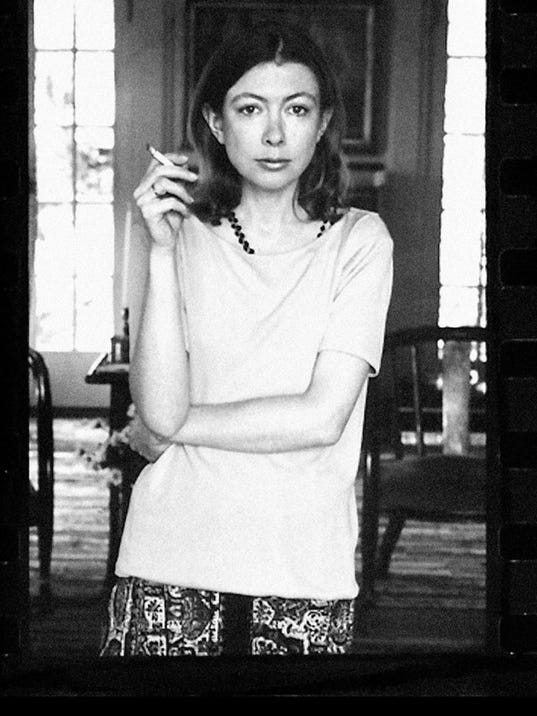Over the weekend, on Netflix, I caught up with the documentary, Joan Didion: The Center Will Not Hold. The film was made by Joan Didion's nephew, Griffin Dunne, who also serves as interviewer. Didion now is 83 years old, and Dunne covers her whole life. We follow her from her California childhood to her non-fiction collections like Slouching Towards Bethlehem and The White Album, through her later political writing and finally to her life in New York City. It spends much time on the death of both her husband, fellow writer John Gregory Dunne, and her daughter, Quintana, events Didion wrote about in The Year of Magical Thinking and Blue Nights. I enjoyed the movie a lot, and I'd especially recommend it for anyone who writes, whether you're a Didion fan or not. Among the film's pleasures: getting to hear many passages read from Didion's work - that crystalline prose with its unerring rhythm.
But the key moment during the movie has to be the one that occurs when Griffin Dunne and Joan are discussing a piece she wrote in the late sixties in the Haight-Ashbury. Drugs are everywhere, as are disaffected people of all sorts, and one day, we hear from the piece, when Joan finds her contact, the contact says that he has something at his place that will blow her mind. She goes with him. He takes her to a room, and Joan describes how when they get there, she sees a child on the living room floor licking her lips with concentration. The only thing off about the girl is that she's wearing white lipstick.
"Five years old," the contact says. "On acid."
Griffin Dunne asks Joan what it was like to be a journalist in that room to see the little kid on acid. Didion's response is delayed. "Well, it was...." she says, and then gestures with her hands, saying nothing, looking down a bit. A couple of seconds go by. There's a tension and suspense as you wait, and you picture how grotesque that scene with the child must have been. And then Joan says, "Let me tell you, it was gold." There's a brief hint of a smile on her face, and a gleam in her eye. As she says, "You live for moments like that if you're doing a piece."
It's a startling moment, and a reminder of something that seems not to get discussed as often as it should when people, including writers, talk about the qualities needed, or at least very helpful, for writing. That quality is detachment. Going further (at least as it applies to Didion), some might call it coldness. "There is a splinter of ice in the heart of a writer," is how Grahame Greene puts it in his autobiography, A Sort of Life, and I've never seen that idea so clearly on display as when Joan Didion lights up and describes as gold the moment she came across a five year old girl on acid. Horrible, of course, but also the type of find that dispassion can transmute into memorable art.
That transmutation is something Joan Didion has done time and again over the course of her remarkable writing life, and this film examines that life well. The movie also served to fire me up to go back to reading Didion again, and that can only be a good thing.
That prose with every sentence just right, that emotion and intelligence all controlled by a beautiful coldness...



No comments:
Post a Comment